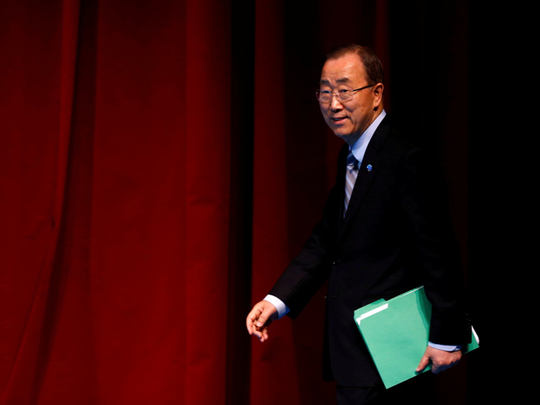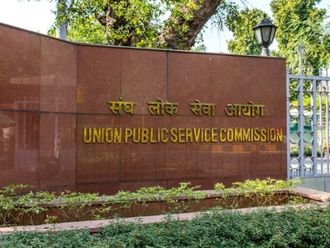
Compared to the media din accompanying the ongoing United States presidential election campaign, the election to find a new United Nations secretary-general may appear to be a low-key event. With incumbent Secretary-General Ban Ki-moon scheduled to retire before the end of the year after two terms, the race for his successor is quietly intensifying.
The new secretary-general, even before being installed in office, will know too well the growing impatience among a large section of the member states over the failure to reform the world body and, particularly, the UN Security Council with its five veto-wielding permanent members (P5) — China, France, Russia, United Kingdom and the US.
Individual member states — or groups of them such as the G4 — underscore the urgency of reforming the archaic UN structures, lamenting that half-hearted statements of intent were not enough. The P5 members have, over the decades, converted the UN Security Council into an exclusive club where they, using their veto powers, often contributed to human tragedies and a travesty of justice.
The veto powers, originally conceived as a mechanism to stop injustices, atrocities and genocides committed by the despots of the world, have today become an effective tool in the hands of the P5 to advance their own interests. With P5 members having created a coterie of client states, finding a quick resolution to a conflict can often become a task of Herculean proportions.
The Syrian conflict, complex and brutal from its very outset, has today evolved into a hideous monstrosity that has acquired new features with the arrival of Daesh (the self-proclaimed Islamic State of Iraq and the Levant), whom everyone wants to control and eliminate, but nobody knows how best to do so. While Russia is blamed for prolonging Syrian President Bashar Al Assad’s political life by backing it at the UN Security Council, the Russians retort that Daesh’s metastasis had its origin in the US invasion of Iraq. This tit-for-tat blame game among the P5 members only prolongs the conflict and this, in turn, can give birth to new and far deadlier actors emerging from a conflict situation, thus adding to human suffering.
The new secretary-general will inherit not only Syria but also other major problems from Ban. The reform of the UN and, particularly, the Security Council is close to the heart of most UN member states. The candidates for secretary-general — there are 11 at present, five of whom are women — have so far been very vague, if they speak at all, about UN reforms, apparently trying to avoid starting on the wrong note with any of the P5 members who will, eventually, approve or disapprove a candidate.
The gallery of candidates includes Irina Bokova (Bulgaria), Helen Clark (New Zealand), Natalia Gherman (Moldova), Antonio Guterres (Portugal), Vuk Jeremic (Serbia), Srgjan Kerim (Macedonia), Miroslav Lajcak (Slovakia), Igor Luksic (Montenegro), Susana Malcorra (Argentina), Vesna Pusic (Croatia) and Danilo Turk (Slovenia). Other candidates may also join the race. One name frequently mentioned in UN diplomatic circles is that of former Australian prime minister Kevin Rudd who may join the fray.
For the first time in the UN’s 70-year history, these candidates are publicly vying for the secretary-general’s job; they made their pitch — the ‘catwalk’, as one diplomat put it — from April 12 to 14, each presenting his or her case to the General Assembly’s 193 member-states and observers, and answering questions raised by the latter. This transparency in the “job interview facing the whole world” poses a sharp contrast to previous contests when candidates and the governments backing them, usually, campaigned behind closed doors.
But without advocacy for the urgently-needed UN reforms, the new secretary-general’s vision will be devoid of credibility and the triumph of transparency over secrecy will only be half a success story. As the world gets mired in conflicts, unleashing catastrophic results for the civilian populations — be it in Syria, Libya, Iraq or elsewhere — one will need to untie the Gordian knot at the UN, reflected in the usual poker games the P5 play in the exclusivity of their club. The future of the world lies in creating a conflict-free environment and focusing on economic development, managing this planet’s fast-depleting natural resources, combating poverty and disease and steering away from climatic cataclysms.
The P5, on their own, will not provide any answers to the burning issues. If we have a new secretary-general who tries to keep everyone happy — the euphemism for being subservient to the P5 — it is hardly going to help meet the world’s challenges. However, the proverbial chicken-and-egg analogy applies here: A strong secretary-general candidate will not get the P5’s approval, but to reform the ‘club’, one needs an independent-thinking incumbent who recognises the dangers of continuing with the flawed system of vesting too much power in one small body. The UN urgently needs to come out of the so-called Teufelskreis — the vicious circle — to avoid a logjam that we are so accustomed to seeing at the world body.
But if the P5 continue with their obstructive tactics and block the urgently-needed reforms, history will not judge them kindly. The sooner the UN changes, the better for humanity.
Manik Mehta is a commentator on Asian affairs.








